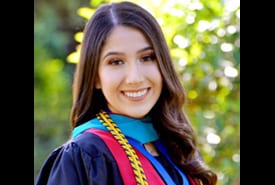At a glance
Meet flu fighters Elia Medina, Monica Parra and Emily Piltch. Elia, Monica and Emily facilitate a wide array of public health projects made possible through a Centers for Disease Control and Prevention Racial and Ethnic Approaches to Community Health (REACH) grant. Emily, with the California Department of Public Health (CDPH), is the program manager at the state level, and Elia and Monica facilitate the program in Madera County and Merced County, respectively.

Background
Elia Medina serves as the health education coordinator for Madera County, and she facilitates several grants for the county. Elia fights flu because through her work with the health department she recognizes the importance of vaccines. She says it's especially important this year because her communities are going through a lot of challenges and sacrifices, so making sure they have the knowledge to make the right decision about getting vaccinated will help provide peace of mind. Elia wants her community members to have access to not only important health information but to flu vaccination, too.

Monica Parra serves as the health education specialist for Merced County, and she implements all the deliverables and the workflow for the REACH program. Monica grew up in Merced County, so this project is close to home because she is a member of the community. Monica fights flu because she loves what she does. Monica was a pre-medical student, so she saw first-hand how not getting vaccinated against flu can have negative outcomes. Both of her parents are high risk, and one year they each got very sick with flu. Luckily, both lived, but Monica remembers the difficulty of that time. Monica wants people to make informed decisions about flu vaccination by addressing misconceptions and removing barriers for people in her community.

Emily Piltch is the program manager for REACH at CDPH. In her role, she ensures all administrative components and reporting occurs, and she is a liaison to both Madera County and Merced County REACH teams. She has subject matter expertise in both nutrition and physical activity. Emily previously worked on a REACH grant on the Navajo Nation, so she was excited to work within another program to promote health equity and flu vaccination.
What is the goal of the program?
Madera County: In Madera County, the focus is on Hispanic and Latino populations, and the goal of the flu immunization component of REACH is to improve flu vaccination coverage in low-income regions by educating and empowering trusted voices in the community so that they can promote flu vaccination. The program develops education materials and distributes the materials through different outlets. The goal is to increase vaccination opportunities and educate and empower the community by raising awareness of the importance of flu vaccination this year more than ever, and by increasing the number of people that get vaccinated. We want to help community members make an educated decision by bringing the resources to them.
Merced County: In Merced County, the overall goal of the program is to motivate residents to receive the flu vaccine and be able to eliminate any barriers that may be present. The flu immunization component of the REACH program seeks to address any myths or questions that the Hispanic and Latino population may have regarding flu vaccination. We utilize different outlets such as schools and churches to promote flu vaccines. Some barriers to flu vaccination we've been working to overcome include language barriers and lack of transportation. During this time, emphasis has also been placed on sharing information to enable residents to distinguish between COVID-19 and the flu. We work to gain trust that the community may not have when it comes to vaccination.
How does the program seek to address flu and health disparities?
Madera County: One of the main things we are doing is working with our public health department to provide free flu vaccination to all Madera County residents at different locations through mobile clinics. We want to make the community aware of these resources and promote that our clinic is also open for vaccinations by appointment only. Also, we are communicating with our local providers or health care institutions to make sure that we help promote their efforts to increase vaccination rates. We provide educational materials that health care providers may need to educate their patients and the community. All information is available in English and Spanish to make sure that we close any information gaps. We provide information through different outlets, such as radio, TV, social media and print to reach as many people as possible.
Merced County: We tend to focus on four different factors: individual, environmental, community, and the mistrust of physicians. With individual factors, when it comes to mistrust of any vaccine information, we try to address that by doing outreach, such as using Facebook Live, and by having trusted community members or providers go out and educate our community. When it comes to environmental factors, we go to the different regions and cities to provide the flu vaccine. More specifically, we know that we have certain locations that are lower income, so being able to serve them is very important. With community factors, like health care coverage, we partner up with pharmacists and providers to offer these mobile flu vaccines completely free, which is important when considering health disparities. We also consider transportation and walking distance when identifying locations to ensure it's accessible. Last is physician mistrust. We work as the liaison between the providers and the patients and address any misconceptions, so they can have more trust when it comes to receiving the flu vaccine.
Why is it important to fight flu in your program’s community?
Madera County: I think it's important to fight flu, especially with our Hispanic population, because English is not their first language. They speak a language that is foreign to the country that they live in. I think they are not able to access a lot of the information, and sometimes they make decisions based on information they hear from other people that may not be true. Making sure our community is educated is very important to avoid complications from flu, and we do so by raising awareness and making the information accessible.
Merced County: It's very important because we have a lot of high-risk individuals with chronic illnesses. We also have health disparities. I think it is very important to fight flu because if these high-risk individuals were to get the flu, there is a high chance that they are going to be hospitalized, and we do not want to burden our hospitals, especially not during this time with COVID-19.
What successes have you realized, or do you hope to realize through this program?
Madera County: I think in the two months we have been doing this program, it has proven to be successful because we have been able to reach out to a large part of our community. We have been able to train community resident champions who are able to speak to other residents about the importance of getting vaccinated. Mobile flu clinics and informational workshops in the school district have been very successful in putting information out there. We received a lot of positive feedback. It makes my job rewarding when the education we are providing is well-received and understood.
Merced County: We've seen successes in how many individuals have attended mobile flu clinics, even with COVID-19. With these efforts, the work that we've done really did encourage individuals to go out and receive the flu vaccine. We now have trusted providers in our community that attend outreach events and answer questions. Having a relationship with the school district has been a success as well. This outreach reaches a lot of members of our community. We've been able to allocate the time and resources to go out there and fight flu and eliminate any misconceptions about flu vaccination.
